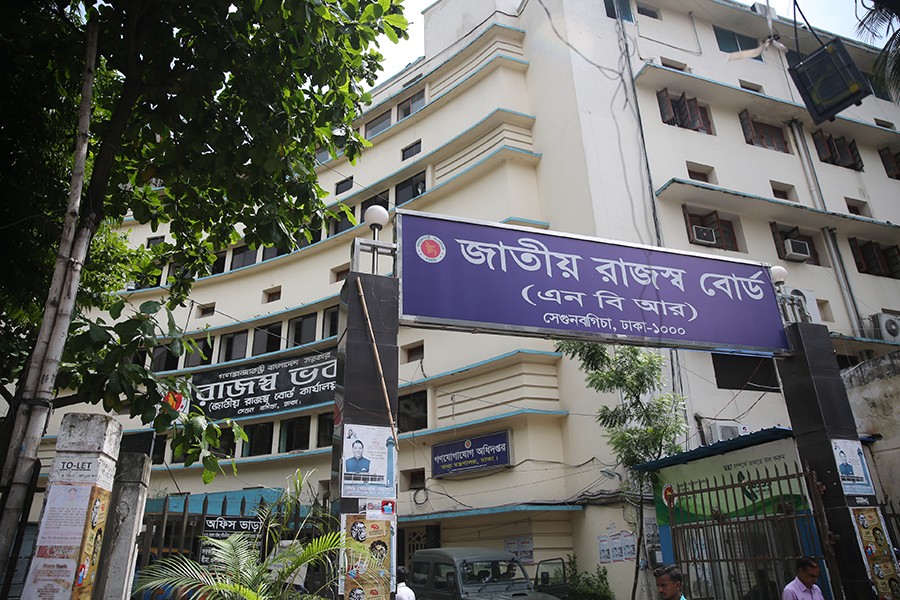The National Board of Revenue (NBR) has intensified its tax survey, inspection, monitoring, and realisation to boost the Tax GDP ratio, currently the lowest in the South Asian region.
The poor situation exists although NBR has recently witnessed a 9.51 per cent growth in individual income tax return submission, reports UNB.
“The Board has already directed all the field offices to intensify and strengthen their respective tax survey to have a justified growth with other wings,” a senior official of the NBR told the news agency wishing anonymity.
He said that the board has also directed the field offices to give extra efforts for collecting advance income tax, which is a good source of collection.
The revenue target for the NBR for FY2021-22 has been fixed at 10.7 per cent, higher than the revised target of FY2020-21. The revenue collection was set at Tk 3.30 trillion during FY2021-22.
In the last FY2020-21, the revised revenue target was Tk 3.01 trillion, while it was set Tk 3.30 trillion in the main budget.
Of the total target, the VAT wing will contribute the lion share with Tk 1.27 trillion which is 11 per cent higher than the revised target of the last fiscal. In the last fiscal the target was Tk 1.25 trillion.
The target for Income Tax and Tax on Profit has been set Tk 1.04 trillion where it was Tk 1.03 trillion in the last fiscal.
The revenue collection from import duty will be Tk 379.070 billion, Tk 544.65 billion from Supplementary Duty, Tk 560 million from export duty, Tk 38.25 billion from Excise Duty while Tk 10.50 billion from other taxes and duties.
As part of intensifying the tax survey information of the flat and house owners in posh areas like Gulshan, Banani, Uttara, Dhanmondi of the capital city will be gathered.
The eligible but not enlisted persons will be given an electronic tax identification number (e-TIN) instantly. “Proper directives have been given to the field level officials,” the NBR official said.
Punitive measures will be taken against the e-TIN holders who fail to submit their income tax returns or apply for time extension.
The NBR teams will visit houses, shops and other commercial establishments in the city’s various areas to find out the potential taxpayers. The officials will take support from service agencies to scrutinise information related to income, wealth, and property of the potentially eligible taxpayers.
The survey teams are collecting information related to national identity card, trade licence and other business documents from people having income from house or business properties and from service or other professions.
NBR has directed the tax commissioners to bring all eligible persons and organisation under the tax net and take initiative to remove the phobia regarding tax payment, sources said.
It also asked to intensify the tax survey and activate the inactive TIN numbers as submitting income tax return has been made mandatory for every TIN holder from this fiscal.
The Income Tax Wing of the NBR has already given necessary directives to the field offices in this regard.
As a part of the internal survey, the field level officials have already collected possible taxpayers information from city corporations, Rajuk and sub-registrar offices. This is popularly called ‘secondary data’.
Secondary data refers to the information of the individuals that are already kept with an organisation.
The NBR also has started to collect information of the potential taxpayers at the upazila level through secondary data gathering, otherwise known as an internal survey.
According to data from the April 2021 issue of the World Economic Outlook, the tax to GDP ratio of the country has been 9.9 per cent on an average since 2016-2020, while it is 19.67 per cent for India, 21.50 per cent for Nepal, 14.88 for Pakistan, 12.74 per cent for Sri Lanka.
The ratio is 24.72 per cent for developing countries and 35.81 per cent for developed countries, according to the data.
The tax-to-GDP ratio is a ratio of a nation's tax revenue relative to its gross domestic product, the value of goods and services produced in a country during a certain period. The ratio is also a marker of how well the government controls a country's economic resources.
According to an official document, the tax to GDP ratio in the current fiscal has been estimated at 10.7 per cent.


